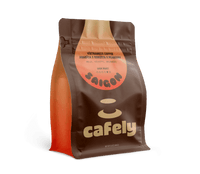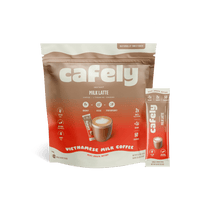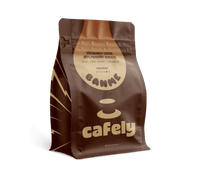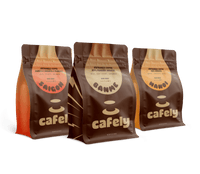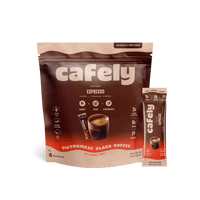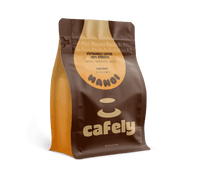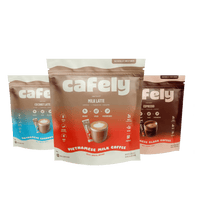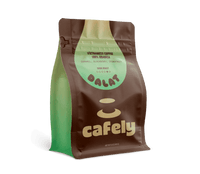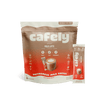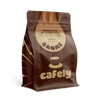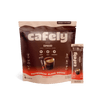Turkish coffee is a traditional, strong, dark arabica coffee that originated in the Middle East. Although commonly called “Turkish coffee," strong arabica brews made using similar brewing methods are popular in several countries in the region.
It’s made using very finely ground coffee beans, water, and (often) sugar. These ingredients are combined in a “cezve” — a traditional coffee pot. The mixture is boiled slowly over low heat for several minutes. Once brewed, it’s served without filtering in small espresso-sized coffee mugs.
In this guide, you’ll learn about what makes Turkish coffee unique, the best coffee beans to use, how to make it, and which foods are traditionally paired with the brew.
Related: Turkish Coffee Brew Guide
What Makes Turkish Coffee Unique?
Although several kinds of coffee use arabica beans, Turkish coffee is unique because of its distinctive brewing method, preparation, and cultural significance.
Here’s what makes Turkish coffee so unique:
1. Coffee & Grind Size
Turkish coffee is made using medium to dark roast arabica beans. The beans are ground extra fine to a texture almost as fine as talcum powder.
The extra fine grind allows the grounds to settle at the bottom of the cezve and the coffee cup it's served in.
2. Brewing Pot (Cezve)

Turkish coffee is brewed in a cezve (or ibrik) — a traditional coffee pot where the ground coffee and water are boiled. It's typically made from copper or brass and is designed specifically for making Turkish coffee.
The pot helps control heat and allows the coffee to be boiled slowly — creating the rich, dark taste and thick, deep body that Turkish coffee is famed for.
3. Unfiltered Brewing Method
Unlike most coffees, Turkish coffee is unfiltered. It's the unique, unfiltered brewing process that gives Turkish coffee its rich, concentrated flavor and thick texture. The fine coffee grounds remain in the cup after serving, which gives the coffee a thicker, stronger, more concentrated flavor.
The unfiltered brewing method also produces a layer of creamy foam on top of the coffee — a highly prized element of Middle Eastern coffee.
4. Slow Brewing Process
Turkish coffee is boiled slowly over low heat, traditionally on hot sand or an open flame. This slow boil allows the extraction to develop fully, producing a concentrated brew with the perfect balance of bitterness and sweetness.
5. Serving Style
Turkish coffee is served in small espresso-sized cups called fincans. It's served black without milk and sugar. If sugar is used, it's added during the brewing process so the grounds in the final cup aren't disturbed.
The coffee is traditionally served with a small glass of water and a piece of Turkish delight or sweet, nutty pastry.
6. Tradition and Coffee Ritual
The cultural significance of Turkish coffee is immense. It's a brew rarely made for one. Instead, a cezve is brewed with care and shared with friends or family in a social setting.
The Turkish coffee ritual provides a moment in many people's busy schedules to sit down and catch up with the people around them. There's also a tradition of “coffee fortune telling,” where the settled grounds in the base of the fincan are observed and interpreted once the brew is finished.
What Coffee is Best for Turkish Coffee?

The best coffee for Turkish coffee is 100% arabica. This bean is known for its rich, smooth flavor and low acidity — perfect for strong, dark Turkish coffee.
The beans are typically roasted medium to dark. The darker the roast, the richer the coffee.
The grind is crucial for Turkish coffee. Use the wrong grind size, and you'll end up with a grainy, soupy brew. The arabica coffee beans must be ground extra fine. This grind size ensures that the grounds settle at the bottom of the cup after serving.
The most popular brand of Turkish coffee is “Kurukahveci Mehmet Efendi.” You can find it in Middle Eastern food stores.
Our DaLat coffee Is also a good option. This 100% dark roast arabica is available in whole bean or pre-ground. Its rich flavor makes a thick, dark Turkish coffee with a deep, creamy crema.
What Do You Need to Make Turkish Coffee?
Turkish coffee only requires three ingredients. However, you will need some specific pieces of equipment you probably don't have in your kitchen.
Here's what you need to make Turkish coffee:
Ingredients
- 100% dark roast arabica coffee
- Water
- Sugar (optional)
Equipment
- Coffee grinder (capable of producing an extra fine grind size)
- Cezve (traditional brewing pot)
- Gas stove
- Fincan (small Turkish coffee cups) or espresso cup
- Wooden stirring spoon
Making Turkish Coffee: Step-by-Step Guide
Making Turkish coffee is a labor of love. Although the process is relatively simple, it can take some practice until you brew the perfect cup. Be patient and mindful of each step of the brewing process.
Here's how to brew Turkish coffee step-by-step:
1. Grind the Coffee

Turkish coffee requires extra finely ground coffee — even finer than what's needed for brewing espresso. You can buy pre-ground Turkish coffee, use a Turkish coffee grinder, or set your burr grinder to the finest setting to achieve this consistency.
You will need one to two teaspoons of finely ground arabica coffee per serving.
2. Measure the Water

Measure out cold water. You will need around 60 mL per serving.
Add the water to your cezve (or ibrik).
3. Add the Coffee

Add one to two teaspoons of coffee per serving to the cezve. Don't stir it just yet. The more coffee you add, the stronger the brew will be. If you're new to Turkish coffee, it's best to start with one teaspoon per serving.
4. Add Sugar (Optional)

If you enjoy a sweetened coffee, add sugar before boiling.
There is no set sweetness for Turkish coffee. It's typically served in black and unsweetened, but it's not uncommon to add sugar.
There are four levels of sweetness In Turkish coffee:
- Sade: No sugar
- Az Şekerli: ½ a teaspoon per serving (lightly sweetened)
- Orta: 1 teaspoon per serving (medium sweetness)
- Şekerli: 1 ½ – 2 teaspoons per serving (sweet)
Note: You can't add sugar after the coffee is brewed. This will disturb the coffee grounds and make the resulting brew grainy.
5. Heat and Stir the Brew

Place the cezve over a low heat (ideally on a gas stove). As the liquid begins to warm, gently stir to combine the coffee, water, and sugar (if using).
Continue heating and stirring slowly, but do not let it boil. You will see a thick foam begin to form — boiling will disperse this and ruin the final crema.
6. Monitor the Coffee and Remove From the Heat

When the foam rises to the top of the cezve, just before the brew begins to boil, remove it from the heat. Spoon some of the foam into the fincans or small espresso-sized serving cups.
Return the cezve to the heat and let the foam rise again. Remove the cezve before it boils, allow to cool slightly, and return to the heat.
Repeat this process two to three times.
7. Pour and Serve

Once the Turkish coffee is brewed, gently pour it into the cups. Do not stir the coffee after serving.
The grounds will settle to the bottom of the cup after one to two minutes. Enjoy by sipping slowly. Discard the final sip — this contains fine coffee grounds.
How to Drink Turkish Coffee
Turkish coffee isn't consumed like other types of coffee. Drinking this brew is a ritual, and there's a certain way to consume it that will enhance the drinking experience.
Here's how Turkish coffee is traditionally consumed:
1. Serving Size and Presentation
Turkish coffee is served in "fincans" — small coffee mugs unique to the Middle East. They are similar in size to espresso cups, with a capacity of 60 to 60 milliliters. These small cups are the perfect size for this strong, rich brew.
Turkish coffee is also served with a foam (crema) that sits on top of the coffee. This foam is created during the brewing process and is highly prized — Turkish coffee isn't the same without it.
2. Sipping Slowly
Turkish coffee should be sipped slowly. Although it's served in small shot-sized cups, it should be savored and enjoyed. When poured from cezve, the cup of Turkish coffee should be left to sit for one to two minutes before drinking to allow the grounds to settle. Once settled, the coffee should be sipped and savored over 10 minutes or so.
3. Serve with a Glass of Water
Turkish coffee is traditionally served with a glass of cold water. The water should be sipped before drinking to cleanse the palate. It should then be sipped after eating to cleanse the palate again before drinking more coffee.
4. A Time for Socializing
Drinking Turkish coffee is a ritual. A cezve of coffee is rarely brewed for one person. Instead, it's made for a group of friends or family. A cezve of coffee should be enjoyed over an hour or two. It's an opportunity to socialize and catch up with the people around you.
5. Reading the Grounds
In Turkish culture, after finishing a cup of coffee, the cup is flipped upside down onto the saucer and allowed to cool. The pattern of the grounds in the cup is interpreted to tell the drinker's fortune. This age-old practice is known as tasseography. It's common for the oldest person on the table to read the grounds to tell the fortune of others around the table.
Although this practice isn't for everyone, the ritual will immerse you in the cultural and sensory experience of drinking Turkish coffee.
6. Serve with Traditional Food
Turkish coffee is typically served with small dishes. Sweet and savory foods such as Turkish delight, baklava, künefe, and dried dates can be consumed during sips to create a flavorful sensory experience during “coffee time.”
What Are the Best Food Pairings for Turkish Coffee
Turkish coffee is traditionally consumed in social settings. It's common for a group of friends to share a cezve of coffee and a range of small dishes.
Turkish coffee pairs well with a variety of sweet and savory foods, enhancing The rich, bold flavor of the arabica coffee.
These foods are commonly paired with Turkish coffee:
1. Turkish Delight
Turkish delight is a sweet, chewy confection that's often flavored with rose, lemon, or pistachio. It's the most common accompaniment for Turkish coffee. Its sweet, floral flavors compliment the strong, dark, bitter notes of the coffee.
2. Baklava
Baklava is a popular Middle Eastern dessert made from layers of filo pastry, chopped nuts, and sweet, sticky syrup or honey. These delicious, flakey pastries are commonly served alongside Turkish coffee.
The nutty flavors of pistachio or walnut and the sweetness of the syrup or honey balance the bitterness of Turkish coffee.
3. Dried Fruits and Nuts
Dried fruits and roasted nuts are commonly served with a cezve of Turkish coffee.
Popular dried fruits to eat with Turkish coffee include dates, figs, and apricots. Walnuts, Hazelnuts, and pistachio nuts often accompany these. The natural sweetness of the dried fruit and the light saltiness of roasted nuts balance the bitter, rich flavors and enhance some of the undertones of the coffee.
4. Künefe
Künefe is a traditional Turkish dessert that's similar to baklava. It's made from a spun, wirely-looking pastry called kataifi. The light, stringy pastry is soaked in a sweet syrup and is typically filled with a mozzarella-like cheese that provides a mild, creamy taste and an oozy, stringy texture.
Künefe is the perfect food pairing for Turkish coffee. The sweet pastry and fatty cheese filling can be heavy on its own. The strong, black, bitter coffee cuts through the fattiness, cleaning the palate between bites.
5. Dark Chocolate

Like most coffee, dark chocolate compliments the rich, nutty flavors of Turkish coffee.
Any high-cocoa chocolate pairs wonderfully with Turkish coffee. The rich, bitter, and slightly sweet flavor of dark chocolate compliments the strong black coffee beautifully. Rose-flavored dark chocolates from Turkey elevate the experience further, providing complex floral flavors that enhance the strong flavors of Turkish coffee.
FAQs: Turkish Coffee
Want to learn more about Turkish coffee?
Check out the answers to the FAQs Below:
1. What Type Of Coffee Beans Are Used For Turkish Coffee?
The best coffee beans for Turkish coffee are dark roast arabica. The smooth, rich flavor of these beans creates a dark, full-bodied brew — typical of Turkish coffee. Robusta coffee beans can also be used, but the resulting brew is far too strong for most people.
2. Can You Make Turkish Coffee Without A Cezve?
Although a cezve is the traditional way to brew Turkish coffee, you can make it without one. Instead, use a stovetop kettle or a small saucepan.
3. How Do You Avoid Grounds In Your Turkish Coffee Cup?
Turkish coffee is unfiltered, so there will always be grounds in the coffee cup. However, if the grind is extra fine, the grounds will settle at the bottom of the cup. Avoid drinking the last sip — this is where the grounds settle.
4. Is Turkish Coffee the Same as Greek Coffee?
Turkish coffee and Greek coffee are similar. They both use a boiling brewing method in a small stovetop pot. They both utilize dark roast arabica beans And are served in the same way.
5. What Is The Tradition Of Reading Turkish Coffee Grounds?
The ritual of reading the grounds that settle at the bottom of a Turkish coffee cup started as a way to tell someone’s fortune. Shapes in the grounds would be read to describe potential outcomes in the near and distant future.
6. Can You Add Spices To Turkish Coffee?
Spices aren't traditionally used in Turkish coffee. However, cinnamon, star anise, and cardamom work well in the brew. Simply combine the coffee grinds with any ground spices of your choice before brewing.
7. Can You Make Turkish Coffee With Milk?
Turkish coffee is typically consumed black. However, milk and sugar can be added at the start of the brewing process.
8. What Other Coffees Are Similar to Turkish Coffee?
Several arabica coffees from the Middle East are made in a similar way to Turkish coffee. Several cultures have their own version of this strong, unfiltered brew. You'll find similar coffees in Greece, Syria, Lebanon, parts of Egypt, and even Morocco.
9. How Do You Sweeten Turkish Coffee?
Turkish coffee must be sweetened before brewing to avoid stirring up the settling grounds after serving. You can add a tablespoon or two to the cezve before starting the brewing process.
10. Can You Use A French Press To Make Turkish Coffee?
No. Turkish coffee should be made in a cezve or a saucepan if the traditional coffee pot is not available to you. This brew is boiled rather than steeped — something that can't be achieved in a French press immersion brewer.
